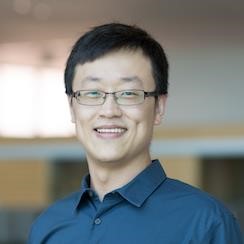报告人: Xin Gao, full professor of computer science at King Abdullah University of Science and Technology (KAUST), Saudi Arabia
报告时间: 2023年7月24日(星期一) 9:30-11:30
报告地点:正新楼三楼yl6809永利官网报告厅
报告题目:AI-aided Peptide Drug Development
报告摘要:
Recent milestones in AI, such as AlphaFold2 and ChatGPT, have opened a new era for AI-aided drug development. Within this new wave, peptide drug, owning to its potential to target conventionally “undruggable” targets and its characteristics that can be well modeled by AI, becomes the most promising drug modality. In this talk, I will introduce our efforts on AI-aided peptide drug development. I will first introduce the overall ChatGPT-like framework that combines de novo peptide generative model with multi-objective optimization-based reinforcement learning. I will then describe how we model and optimize various properties of peptide drugs, such as binding affinity, stability and cell penetration ability. I will finally show that these novel AI methods, when being in closed-loop development with wet lab experiments, can lead to promising pre-clinical candidates in drug discovery.
报告人简介:

Dr. Xin Gao is currently a full professor of computer science at King Abdullah University of Science and Technology (KAUST), Saudi Arabia, and co-founder and CAIO of Syneron Technology. He is also the Director of the Computational Bioscience Research Center (CBRC), Deputy Director of the Smart Health Initiative (SHI), and the Lead of the Structural and Functional Bioinformatics (SFB) Group at KAUST. Prior to joining KAUST, he was a Lane Fellow at Lane Center for Computational Biology at Carnegie Mellon University. He earned his bachelor degree in Computer Science in 2004 from Tsinghua University and his Ph.D. degree in Computer Science in 2009 from University of Waterloo.
Dr Gao’s research interest lies at the intersection between computer science and biology. In the field of computer science, he is interested in developing machine learning theories and methodologies related to deep learning, probabilistic graphical models, kernel methods and matrix factorization. In the field of bioinformatics, his group works on building computational models, developing machine learning techniques, and designing efficient and effective algorithms to tackle key open problems along the path from biological sequence analysis, to 3D structure determination, to function annotation, to understanding and controlling molecular behaviors in complex biological networks, and, recently, to biomedicine and healthcare.
He has published more than 340 papers in the fields of bioinformatics and machine learning, with a total citation of over 8000 and h-index of 48. He is the leading inventor of over 60 international patents, and have been the PI on research grants of more than USD$25 million. He is the associate editor of Bioinformatics, Journal of Translational Medicine, Genomics, Proteomics & Bioinformatics, BMC Bioinformatics, Journal of Bioinformatics and Computational Biology, Quantitative Biology, and Complex & Intelligent System, and the guest editor-in-chief of IEEE/ACM Transactions on Computational Biology and Bioinformatics, Methods, and Frontiers in Molecular Bioscience.
主办单位:
yl6809永利官网yl6809永利官网
yl6809永利官网未来科学国际合作联合实验室

